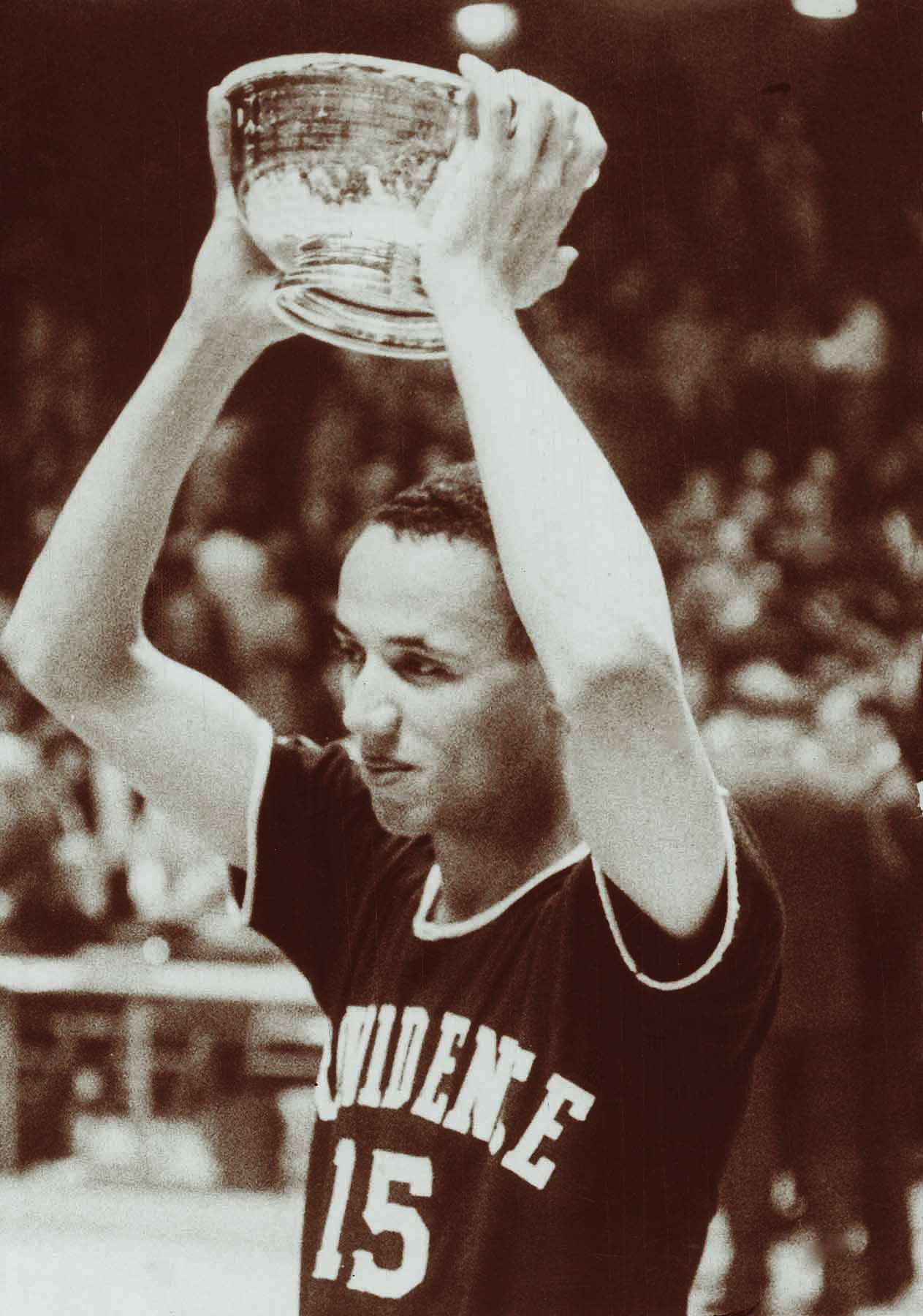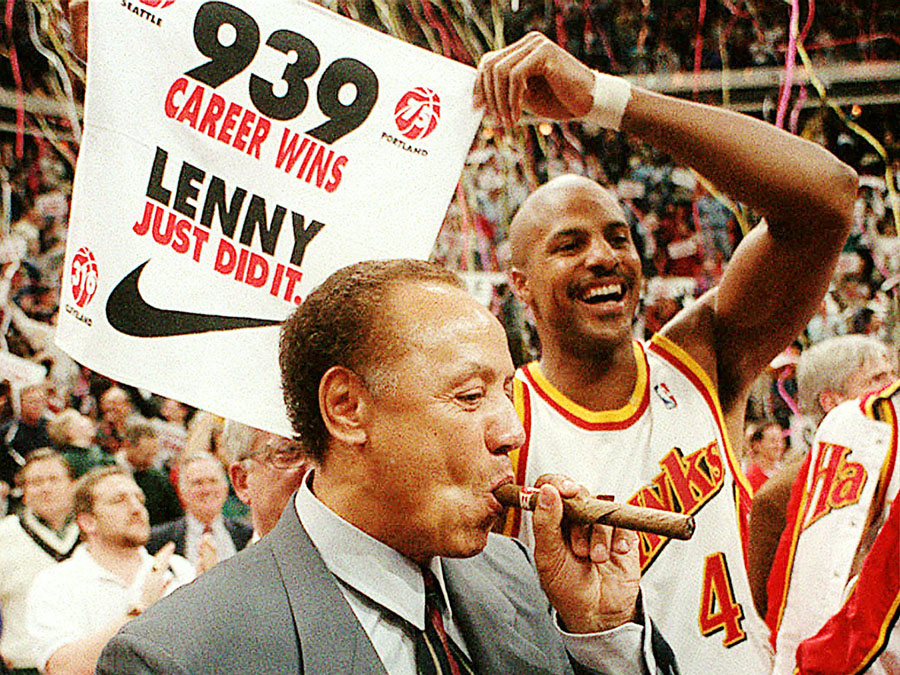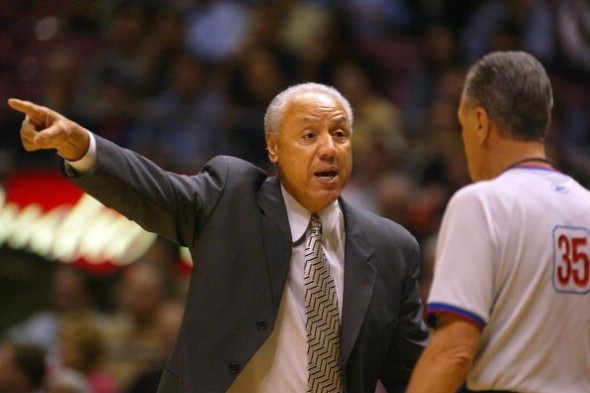Lenny Wilkens
Lenny Wilkens

Lenny Wilkens is one of the most celebrated figures in the history of basketball, achieving success both as a player and a coach at the highest levels of the game.
As a player, Wilkens was a versatile and skilled guard who made a significant impact on the court. He earned a place in the prestigious NBA All-Star Game nine times during his playing career, showcasing his talent and consistency over the years. His contributions as a player were further recognized with his induction into the Naismith Memorial Basketball Hall of Fame in 1989.
Transitioning to coaching, Wilkens continued to excel and leave his mark on the game. He guided teams with wisdom, strategy, and leadership, earning accolades and recognition for his coaching prowess. Wilkens was named the NBA Coach of the Year in 1993, a testament to his ability to inspire and motivate his players to success.
Wilkens' coaching career reached its pinnacle when he led the Seattle SuperSonics to the NBA championship in 1979, cementing his legacy as one of the greatest coaches in NBA history. His coaching acumen was further underscored by his multiple appearances as head coach in the NBA All-Star Game.
In addition to his success in the NBA, Wilkens also made significant contributions to international basketball as the head coach of the 1996 U.S. men's basketball team, guiding them to an Olympic gold medal.
Wilkens' impact on the game extends beyond his coaching achievements. He holds the record for most regular-season coaching wins in NBA history, a testament to his longevity, consistency, and dedication to the sport. His influence on the game has been recognized with multiple inductions into the Basketball Hall of Fame and other prestigious honors, including being named to the NBA 50th and 75th Anniversary Teams.
Lenny Wilkens' legacy as a player, coach, and ambassador for the game of basketball will forever be remembered and celebrated in the annals of sports history.
Lenny Wilkens' upbringing in the diverse neighborhood of Bedford-Stuyvesant in Brooklyn, New York, played a significant role in shaping his identity and perspective. Coming from a multicultural background with an African American father and an Irish American mother, Wilkens was exposed to different cultures and traditions from an early age. Despite the challenges and social dynamics of his environment, Wilkens found common ground and unity through his Catholic faith, which provided him with a sense of belonging and purpose./cdn.vox-cdn.com/uploads/chorus_image/image/64084592/844325696.jpg.0.jpg)
During his formative years at Boys High School, Wilkens honed his basketball skills under the guidance of coach Mickey Fisher, alongside notable athletes like Tommy Davis, who would go on to achieve success in Major League Baseball. It was here that Wilkens developed his passion for the game and began to showcase the talent and determination that would propel him to greatness in the world of basketball.
Wilkens' experiences growing up in Brooklyn instilled in him the values of resilience, hard work, and perseverance, qualities that would define his illustrious career both on and off the basketball court. His journey from the streets of Bedford-Stuyvesant to the pinnacle of basketball success serves as an inspiring example of the power of determination and the pursuit of excellence against all odds.
Lenny Wilkens' professional basketball career commenced with the St. Louis Hawks, who selected him with the sixth overall pick in the 1960 NBA draft. From the outset, Wilkens proved to be a valuable asset to the team, contributing significantly to their success on the court.
In his rookie season, Wilkens played a pivotal role as the Hawks advanced to the NBA Finals, ultimately falling short against the dominant Boston Celtics. Despite this setback, Wilkens' performance earned him recognition as one of the league's emerging talents.
Over the course of his eight seasons with the Hawks, Wilkens consistently demonstrated his skill and leadership, helping the team secure playoff berths on a regular basis. However, despite their competitive edge, the Hawks were unable to replicate their initial success in reaching the NBA Finals.
Wilkens' standout performances did not go unnoticed, as he garnered acclaim throughout the league. In the 1967–1968 season, he achieved remarkable success, finishing second only to basketball legend Wilt Chamberlain in the MVP balloting. This recognition underscored Wilkens' status as one of the premier players in the NBA during his tenure with the Hawks.
Despite the absence of a championship title during his time with the Hawks, Wilkens' impact on the team and his individual accomplishments laid the foundation for a remarkable career that would span several decades, both as a player and later as a highly successful coach.
After being traded to the Seattle SuperSonics, Lenny Wilkens quickly asserted himself as a key player for the team. In his inaugural season with the SuperSonics, Wilkens delivered an impressive performance, averaging 22.4 points, 6.2 rebounds, and 8.2 assists per game. His exceptional contributions on the court earned him recognition as an All-Star player in three of his seasons with the franchise.
In addition to his stellar play as a point guard, Wilkens also assumed the role of head coach for the SuperSonics in his second season with the team. Despite the dual responsibilities of coaching and playing, Wilkens demonstrated remarkable leadership both on and off the court. Under his guidance, the SuperSonics experienced steady improvement, with their win-loss record showing noticeable progress each season.
During the 1971–72 NBA season, the SuperSonics achieved a significant milestone, winning 47 games—a testament to Wilkens' ability to motivate and elevate the performance of his teammates. Despite their success in the regular season, the SuperSonics fell short of reaching the playoffs during Wilkens' tenure as both player and coach.
Following the 1971–72 season, Wilkens found himself traded to the Cleveland Cavaliers—a move that was met with disappointment and frustration among SuperSonics fans. Without Wilkens' leadership on the court, the SuperSonics experienced a decline in performance, finishing the subsequent season with a record of 26-56—a stark contrast to their achievements with Wilkens at the helm.
Wilkens' time with the Seattle SuperSonics left an indelible mark on the franchise, not only for his contributions as a player but also for his leadership and coaching acumen. Despite the challenges and changes that followed his departure, Wilkens' impact on the team's culture and performance continued to resonate throughout the organization.
References
- "NBA at 50: Top 50 Players". NBA.com. Retrieved March 1, 2022.
- ^ "NBA 75". NBA.com. Archived from the original on February 17, 2022. Retrieved March 1, 2022.
- ^ "NBA unveils 15 best coaches in league history to celebrate 75th anniversary". Sportsnet.ca. February 8, 2022. Retrieved March 1, 2022.
- ^ "Spurs coach Gregg Popovich passes Wilkens for No. 2 on all-time coaching wins list". NBA.com. February 16, 2022. Retrieved February 16, 2022.
- ^ Wilkens presented Chuck Daly Lifetime Achievement Award | NBA.com Archived July 14, 2014, at the Wayback Machine
- ^ Beck, Howard. "PRO BASKETBALL; Wilkens Denies He Was Asked to Go", The New York Times, September 28, 2005. Accessed November 20, 2007. "A native of Brooklyn's Bedford-Stuyvesant neighborhood, Wilkens had added motivation to succeed in New York, which made leaving so quickly that much tougher."
- a b Smith, Gary (December 5, 1994). "He Has Overcome". Sports Illustrated. Retrieved July 31, 2008.
- ^ Gastineau, Mark; Thiel, Art; Rudman, Steve (2009). The Great Book of Seattle Sports Lists. United States: Running Press. pp. 261–262. ISBN 9780762435227.
- ^ "NBA 75: At No. 75, Lenny Wilkens was the embodiment of the player as coach on the floor".
- ^ Evans, Jayda (December 1, 2006). "Wilkens a Sonic again – as vice chairman". The Seattle Times.
- ^ "SONICS: Lenny Wilkens Confirmed as President of Basketball Operations". NBA.com. Archived from the original on May 17, 2007. Retrieved May 19, 2007.
- ^ "Lenny Wilkens Foundation". Archived from the original on April 19, 2012. Retrieved April 25, 2012.
- ^ Sports | Where are they now? Championship Sonics remain near and far between Seattle Times. Retrieved December 12, 2018.
- ^ Boggs, Justin (March 9, 2022). "Cavs add former players, owner, coach to Wall of Honor". Spectrum News 1. Retrieved March 11, 2022.
- ^ "Lenny Wilkens: City renames street after former Seattle SuperSonics coach, player". KOMO News. October 28, 2021. Retrieved October 28, 2021.








































